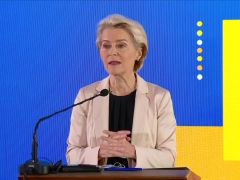The government of Republika Srpska delivered its 12th report to the United Nations Security Council today. The report advises the Council on the entity’s positions on a range of issues relevant to the international community’s involvement in BiH, and summarizes the progress the RS has made in several areas. The executive summary of the report is below.
Introduction and Executive Summary
Republika Srpska (RS), a party to all of the annexes that comprise the Dayton Accords, respectfully submits this 12th Report to the UN Security Council, which outlines the RS Government’s views on key issues facing Bosnia and Herzegovina (BiH). Among the issues it examines are those surrounding the RS priorities of improving economic opportunities, reforming BiH-level institutions, protecting BiH’s decentralized constitutional structure, and securing the closure of the Office of the High Representative (OHR).
I. Recovery, growth, and jobs
In May, floods caused by BiH’s heaviest rains in 120 years caused immense damage to RS homes, businesses, farms, and infrastructure. The RS has mobilized every available resource for relief, recovery, and rebuilding while ensuring transparency and accountability for the funds raised and spent. The RS is continuing to implement economic reforms to improve the RS’s environment for business and investment. The RS is also pressing ahead with legal and regulatory reforms necessary for European integration, even as BiH’s progress is blocked by disagreements within BiH’s other Entity, the Federation of Bosnia and Herzegovina (FBiH). Moreover, the RS is stepping up its fight against corruption and its vigilance against terrorism.
II. The failure of BiH-level institutions must be corrected.
BiH-level institutions are badly in need of reform. Although the Constitution provides for only a small number of BiH-level institutions, years of OHR decrees and other interventions have left Sarajevo with a jumble of expensive, ineffective, and unconstitutional agencies. A July report by the International Crisis Group (ICG) calls the BiH-level bureaucracy a “zombie administration, providing full employment for civil servants but few services to citizens.” The RS is working in particular to reform the BiH-level justice system, which the EU has acknowledged requires changes to meet European standards.
III. BiH’s indispensible Dayton structure
The RS is committed to protecting the structure established in the BiH Constitution. Its mechanisms to protect BiH’s Constituent Peoples are vital to the country’s stability. The Constitution’s limits on BiH-level competencies are essential to BiH’s proper functioning; the deadlocks that are common in BiH-level policymaking would be much less likely if BiHlevel governance were limited to its constitutional competence. The Constitution is also important because its federal structure enables Entities to enact policy innovations for which it would have been impossible to develop consensus at the BiH level.
IV. Closure of OHR is long overdue.
The OHR must be closed at last. The High Representative’s claimed authority to decree laws, depose elected officials, and punish individuals without any due process is unlawful and undermines BiH’s political development. Despite an evaporation of international support for the OHR in recent years, the OHR has continued to interfere detrimentally in BiH policymaking, such as with his obstruction late last year of legislation to implement a broad agreement on state and military property.
V. The Security Council should end the application of Chapter VII.
Security Council resolutions and other sources have repeatedly acknowledged the “calm and stable” situation in BiH. After almost 19 years of peace in BiH, there is simply no justification for the application of Chapter VII.


